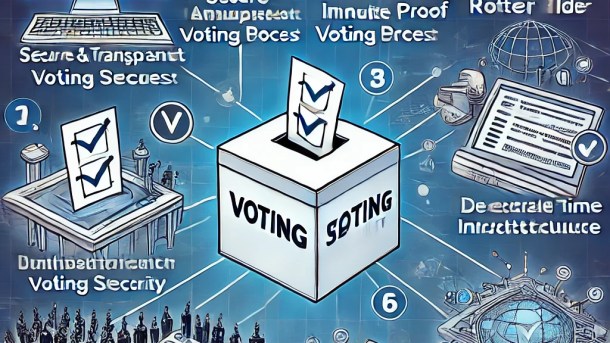Voting is a fundamental right and cornerstone of democracy. It allows citizens to have a voice in choosing their leaders and shaping the policies that affect their lives. However, the integrity and security of voting systems have come under increased scrutiny in recent years, with concerns about hacking, voter fraud, and other forms of tampering.
One potential solution to these challenges is the use of blockchain technology. Blockchain is a decentralized, distributed ledger system that has gained widespread attention for its potential to revolutionize various industries, including finance, supply chain management, and healthcare. In the context of voting, blockchain could provide a secure, transparent, and tamper-proof way to record and tabulate votes.
This article will explore how blockchain can improve voting security, including its potential benefits, challenges, and real-world examples of its use in voting systems.
What is Blockchain?
Before diving into how blockchain can improve voting security, it’s important to understand what blockchain is and how it works.
At its core, a blockchain is a digital ledger of transactions that is distributed across a network of computers. Each block in the chain contains a number of transactions, and every block is linked to the previous block using cryptographic techniques. This creates a secure and tamper-proof record of all transactions on the network.
One of the key features of blockchain is its decentralization. Unlike traditional ledgers, which are typically maintained by a central authority, blockchain ledgers are maintained by a network of users. This means that no single entity has control over the ledger, making it more resistant to tampering and manipulation.
Another important feature of blockchain is its transparency. All transactions on a blockchain network are visible to all participants, creating a high level of accountability and trust. This transparency can be particularly valuable in the context of voting, where the integrity of the process is paramount.
Benefits of Blockchain for Voting
There are several potential benefits of using blockchain technology for voting:
- Increased Security
One of the primary benefits of blockchain for voting is increased security. Because blockchain ledgers are decentralized and distributed across a network of computers, they are much more difficult to hack or tamper with than traditional voting systems.
In a blockchain-based voting system, each vote would be recorded as a transaction on the blockchain ledger. This would create an immutable record of all votes cast, making it nearly impossible for anyone to alter or delete votes after they have been recorded.
Additionally, the use of cryptographic techniques in blockchain networks provides an added layer of security. Each block in the chain is linked to the previous block using a cryptographic hash, making it extremely difficult to modify any block without detection.
- Improved Transparency
Another key benefit of blockchain for voting is improved transparency. In a traditional voting system, the process of counting and tabulating votes is often opaque and difficult for observers to verify. This lack of transparency can lead to concerns about the integrity of the process and the accuracy of the results.
With a blockchain-based voting system, however, all votes would be recorded on a public ledger that is visible to all participants. This would allow anyone to audit the results of the election and verify that all votes have been counted accurately.
This level of transparency could help to build trust in the voting process and reduce concerns about fraud or manipulation. It could also make it easier for election officials to identify and investigate any irregularities or discrepancies in the results.
- Increased Accessibility
Blockchain-based voting systems could also increase accessibility for voters. In traditional voting systems, voters often have to travel to a physical polling location to cast their ballot. This can be a barrier for some voters, particularly those with disabilities or transportation challenges.
With a blockchain-based voting system, however, voters could potentially cast their ballot from anywhere with an internet connection. This could make it easier for more people to participate in elections and have their voices heard.
Additionally, blockchain-based voting systems could potentially enable more secure and efficient remote voting for military personnel, overseas citizens, and other groups who may have difficulty accessing traditional polling locations.
- Reduced Costs
Another potential benefit of blockchain for voting is reduced costs. Traditional voting systems can be expensive to operate, with costs associated with printing ballots, staffing polling locations, and tabulating results.
With a blockchain-based voting system, many of these costs could potentially be reduced or eliminated. For example, there would be no need to print physical ballots, as all votes would be recorded electronically on the blockchain ledger.
Additionally, the use of smart contracts in blockchain networks could automate many of the processes involved in conducting an election, such as verifying voter eligibility and tabulating results. This could potentially reduce the need for manual labor and associated costs.
Challenges of Implementing Blockchain for Voting
While the potential benefits of blockchain for voting are significant, there are also several challenges that would need to be addressed in order to implement it successfully:
- Voter Verification
One of the key challenges of implementing blockchain for voting is ensuring that only eligible voters are able to cast a ballot. In a traditional voting system, voters typically have to provide identification and proof of eligibility before they are allowed to vote.
With a blockchain-based voting system, however, it may be more difficult to verify the identity and eligibility of voters. Because votes are cast electronically and anonymously, there is a risk that ineligible voters could cast ballots or that individuals could vote multiple times.
To address this challenge, blockchain-based voting systems would need to implement robust identity verification processes. This could potentially involve the use of biometric data, such as fingerprints or facial recognition, to ensure that each voter is unique and eligible to vote.
- Ensuring Anonymity
Another challenge of implementing blockchain for voting is ensuring the anonymity of voters. In a traditional voting system, ballots are typically cast in private and are not linked to the identity of the voter.
With a blockchain-based voting system, however, all transactions are recorded on a public ledger. This means that if a voter’s identity were linked to their vote, it could potentially be visible to anyone with access to the ledger.
To address this challenge, blockchain-based voting systems would need to implement privacy-preserving techniques, such as zero-knowledge proofs or ring signatures, to ensure that votes remain anonymous and cannot be linked to individual voters.
- Accessibility and User Experience
Another challenge of implementing blockchain for voting is ensuring that the system is accessible and user-friendly for all voters. While blockchain technology has the potential to increase accessibility by enabling remote voting, it may also present barriers for some voters who are not familiar with the technology.
To address this challenge, blockchain-based voting systems would need to be designed with user experience in mind. This could involve creating intuitive interfaces, providing clear instructions and support, and ensuring that the system is compatible with a wide range of devices and platforms.
Additionally, efforts would need to be made to educate voters about the technology and how to use it effectively. This could involve public awareness campaigns, training programs, and partnerships with community organizations to reach underrepresented groups.
- Regulatory and Legal Challenges
Finally, implementing blockchain for voting would likely face significant regulatory and legal challenges. In many countries, voting systems are heavily regulated and subject to strict security and auditing requirements.
Blockchain-based voting systems would need to comply with these regulations and demonstrate that they meet or exceed the security and integrity standards of traditional voting systems. This could involve extensive testing, auditing, and certification processes.
Additionally, there may be legal challenges related to the use of blockchain for voting. For example, there may be questions about the admissibility of blockchain-based voting records as evidence in court, or about the liability of election officials in the event of a security breach or other failure.
To address these challenges, policymakers and election officials would need to work closely with blockchain experts and other stakeholders to develop appropriate regulations and legal frameworks for the use of blockchain in voting systems.
Real-World Examples of Blockchain Voting
Despite the challenges, there have been several real-world examples of blockchain being used for voting in recent years:
- West Virginia, USA
In 2018, the state of West Virginia piloted a blockchain-based mobile voting system for overseas military personnel. The system, developed by a company called Voatz, allowed military voters to cast their ballots using a smartphone app that recorded their votes on a private blockchain network.
The pilot was considered a success, with over 140 military personnel using the system to cast their ballots in the 2018 midterm elections. However, the system also faced criticism from security experts who raised concerns about the potential for hacking and other vulnerabilities.
- Estonia
Estonia has been a leader in the use of digital technology in government, including the use of blockchain for various applications. In 2016, the country launched a blockchain-based system for storing and securing government records, including those related to voting.
While the system does not use blockchain for the actual casting of votes, it does use blockchain to ensure the integrity and security of the voter registration database. This helps to prevent tampering and ensure that only eligible voters are able to participate in elections.
- Sierra Leone
In 2018, the non-profit organization Agora used blockchain technology to observe and verify the results of a presidential election in Sierra Leone. The system used a private blockchain network to record votes cast at polling stations, which were then compared to the official results reported by the government.
While the system was not used for the actual casting of votes, it demonstrated the potential for blockchain to be used as a tool for increasing transparency and trust in election results.
The use of blockchain technology for voting has the potential to increase security, transparency, and accessibility in elections. By creating an immutable record of all votes cast and enabling secure remote voting, blockchain could help to address many of the challenges and concerns associated with traditional voting systems.
However, implementing blockchain for voting also presents significant challenges, including the need for robust identity verification, privacy-preserving techniques, and user-friendly design. Additionally, regulatory and legal frameworks would need to be developed to ensure that blockchain-based voting systems comply with existing standards and requirements.
Despite these challenges, the potential benefits of blockchain for voting are significant, and there have been several real-world examples of the technology being used in elections around the world. As policymakers and election officials continue to explore the use of blockchain in voting systems, it will be important to carefully consider both the opportunities and the risks, and to work collaboratively with experts and stakeholders to develop secure, transparent, and accessible solutions.
Ultimately, the goal of any voting system should be to ensure that every eligible voter is able to participate in the democratic process and that their vote is counted accurately and fairly. By leveraging the power of blockchain technology, we may be able to take important steps towards achieving that goal and strengthening the integrity of our democratic institutions.



















